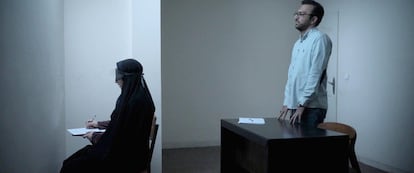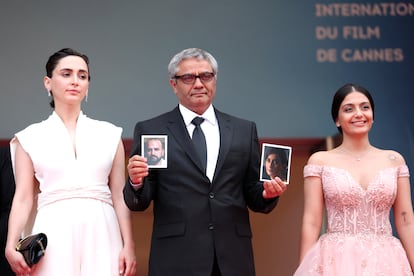It was the beginning of May 2024. On the eve of the presentation of his new film to competition at the Cannes Festival, in France, Mohammad Rasooulof received the news that he had been sentenced, in his native Iran, eight years in prison, to prison, Receive lashes and the confiscation of its properties for the crime of “collusion with the intention of committing crimes against the security of the country.” His crime, according to the justice of the Islamic Republic, was to portray, in The seed of the sacred fruitthe protests in Tehran, in 2022, following the case of Mahsa Amini, a 22 -year -old girl, who for “inappropriate” the hiyab was arrested at a police station, of which he would leave three days later with brain death after suffer a beating by the Police, according to the UN independent investigation mission on Iran.
The film, secretly shot and with its director supervising production under house arrest – was condemned in 2022 for criticizing the repression of protests unleashed by the collapse of a building that caused dozens of dead -, has been nominated in the category of best Non -English -speaking film at the Oscar Awards, which are held on March 2. The director will represent Germany, where he remains in exile after leaving his country last year. Its competitors are Emilia Pérez (France), Flow (Latvia), I’m still here (Brazil) and The needle girl (Denmark).
In The seed of the sacred fruitRasoulof Rasoulof makes a drama tour of thriller to introduce the viewer in the fracture of a family in the face of awareness of its two daughters. The father, a judge of the regime, is one more piece of a patriarchal theological system that is not willing to change. However, at his home his wife knows the wave of protests that followed the death of Mahsa Amini through official television while his two daughters do it through social networks. In a seemingly quiet and happy home, but full of silences, the director appeals to the use of real files of what happened almost three years ago to question a society shaken by violence against women.
In the film the camera plays a complex role, both as a regime weapon when recording the forced confessions, as well as an resource of the demonstrations that seeks to witness state violence during protests. Rasoulouf, who was already judged and was imprisoned on two previous occasions, was aware of the ways of operating of the Ayatolas regime.
“This double use seemed interesting to me. I myself during all those years of judgments, interrogations and in prison I had seen how the camera was also used to humiliate prisoners, to break the human dignity and despite that, these people continued to resist and say ‘no’ in front of the camera. All this seemed to me an interesting issue and dimension to incorporate into the film, ”explains Rasooulof with the help of an interpreter through a video call.
The film, available on the billboard in North American territory (United States, Canada and Mexico), also addresses a problem that not only applies to Iran: how control and tyranny masks a feeling like love, either to sovereignty, To progress, to the country or the country, so that autocrats or dictators and their desire for control go unnoticed as a supposedly reflected genuine concern in the Citizen welfare concerns.
“A very decisive aspect in the reality of tyrannies and dictatorships is this indoctrination of the members of these systems. There is a sacred dimension that is imposed and that justifies repression and control, which makes it impossible to criticize. That people, like the mother’s character in the film, put this affective, religious and sacred dimension in the name of love, family stability and preserve their own economic and social stability, is what ensures the survival of this system, ” Add.

The nomination of the film to the Oscar, which previously had its passage through important festivals such as Cannes, where it received a mention from the jury, was received with “much happiness” by the director, since it represents being able to amplify the voice of what They seek to convey on the situation in Iran and recognize the work of the entire team that participated in the film, which risked by being part of this project to defend their human and artistic rights.
The director, as he told Variety In an interview, he supports the members of his cast and team who have been accused of “spreading immorality and propaganda” against the Iranian regime. He also said that the government is “waiting to announce the verdict after the Oscars.”
The Iranian filmmaker is currently one of the most important in his country. In 2020 he won the gold bear with The life of others And in 2017 his film A Man of Integrity It was chosen as the best film in the “A certain look” section. While his critical cinema with the Ayatolas regime was less direct in its beginnings, in The seed of the sacred fruit It goes fully towards direct political confrontation.
“When I started it was like a self -protection reflection. I realized that there was a contradiction, because in terms of context, I was denouncing aspects of my country’s political life. I did not assume responsibility for what I was denouncing and this contradiction is something that I did not like and that I could not continue to adopt as cinematographic language. I decided that the metaphor that came from fear, because it can also be an aesthetic choice, was something that was going to avoid. I was going to tell my stories much more directly and without concessions, ”he concludes.

